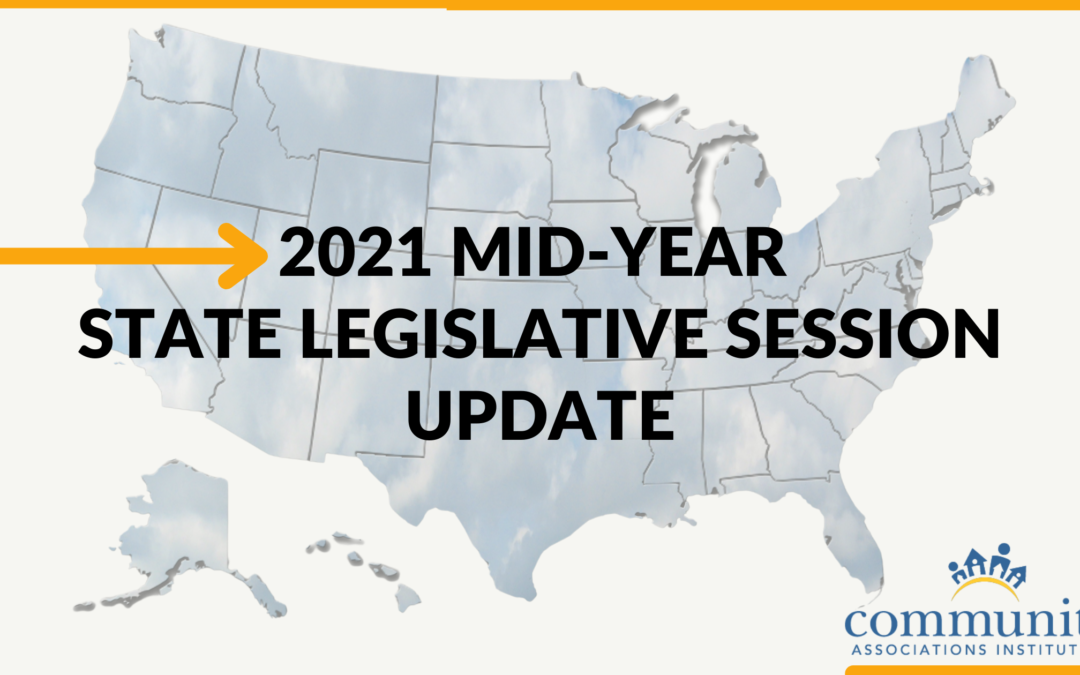Our state update covers all 50 states that convened their legislative session in 2021. More than 30 states have formally adjourned for the calendar year, with three holding their first special session. Over the past six months, CAI’s 36 state legislative action committees (LACs) and more than 600 volunteer committee members worked tirelessly to advocate on behalf of the community association housing model. Consistent with the world around us, this year has been like no other.
CAI is tracking more than 1,200 bills across the country that impact community associations. While all pieces of legislation are important, CAI identified trends that became priority issues. We broke these priorities into two categories: COVID-19 related and general community association housing model. Below is a summary of legislative trends for the first half of 2021.
COVID-19 Related Advocacy Priority Update
Limited liability protections. CAI supports legislation that limits a community association’s exposure to liability when acting in good faith and complying with local and state ordinances and guidelines from the Centers for Disease Control and Prevention related to opening or reopening amenities and governing association operations during the pandemic.
To date, 25 states introduced legislation in 2021 providing limited liability protections, including Alabama, Arkansas, Arizona, Colorado, Connecticut, Florida, Georgia (extension), Idaho, Indiana, Kentucky, Maryland, Minnesota, Missouri, Montana, Nebraska, New Hampshire, New Jersey, Oregon, Pennsylvania, South Carolina, South Dakota, Texas, West Virginia, and Wyoming.
To date, 12 states passed limited liability protection legislation, including Alabama, Arizona, Florida, Georgia, Idaho, Indiana, Montana, Nebraska, South Carolina, South Dakota, West Virginia, and Wyoming. These state laws provide a level of protection to community associations from COVID-19-related lawsuits. CAI’s LACs will continue to pursue liability protections in states without existing laws.
Virtual meetings. CAI supports legislation that allows community association board meetings and annual membership meetings to be held virtually during and after the pandemic. These meeting rules and regulations vary from state to state and often are contingent on an association’s governing documents. Many states require associations to follow a nonprofit or business corporation act. If an association’s governing documents are silent on virtual meeting regulations, the nonprofit or business corporation act may allow an association to hold them.
While quite a few state statutes authorize board and annual meetings to be held virtually, many states will benefit from clarification and codification for permanent authority beyond the pandemic.
To date, 24 states and the District of Columbia introduced legislation this year that allow community associations to hold virtual meetings, including Arizona, California, Connecticut, Florida, Georgia, Hawaii, Illinois, Maine, Maryland, Massachusetts, Missouri, Nevada, New Jersey, New York, North Carolina, Oregon, Tennessee, Texas, Virginia, Washington, and Wisconsin. Eight states—Connecticut, Florida, Hawaii, Maryland, Montana, Texas, Washington, and Virginia—passed legislation to allow community associations to hold virtual meetings.
Electronic voting. CAI supports legislation that allows community associations to use electronic voting for elections. Electronic voting, if conducted properly, can increase engagement, save money, and provide a practical solution to in-person voting while keeping residents safe during the COVID-19 pandemic.
Hawaii, Massachusetts, Maryland, Nevada, North Carolina, Oregon, and Virginia introduced legislation this year permitting electronic voting. Hawaii, Maryland, and Virginia signed their respective electronic voting legislation into law.
Community Association Housing Model Advocacy Priority Update
Removal of discriminatory and unenforceable restrictive covenants. To advance racial equity, CAI supports a process that allows a community association board to remove antiquated and unenforceable discriminatory restrictions contained in covenants without a vote of the homeowners. CAI advocates for states to adopt legislation that provides a process to remove restrictions deemed to be discriminatory under the federal Fair Housing Act and/or state anti-discrimination laws.
Fifteen states have introduced legislation giving a community association the ability to remove discriminatory and unenforceable restrictive covenants from their governing documents in recent years, including California, Connecticut, Florida, Indiana, Illinois, Michigan, Montana, New Jersey, New York, Ohio, Oregon, Texas, Utah, Washington, and Wyoming. This year, Florida, Oregon, Utah, and Washington passed their bills with support of their state LACs. Existing statutes are in California, Delaware, Maryland, Massachusetts, Minnesota, Missouri, and Virginia.
If you have any questions, please reach out to CAI’s Government and Public Affairs team at government@caionline.org. To read more about CAI’s 2021 advocacy priorities and resources, click here. To find out what your state legislative action committee is working on, click here.



